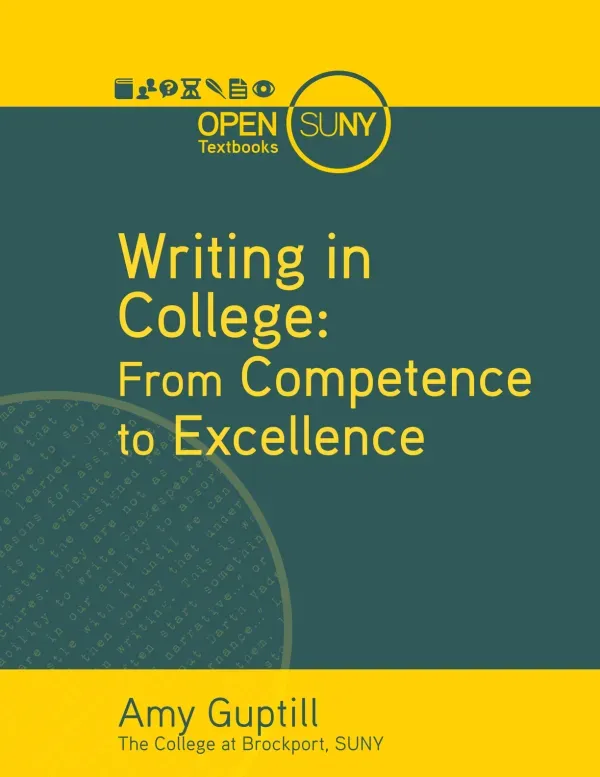
Navigating College Writing: From Competence to Excellence
Document information
| Author | Amy Guptill |
| instructor | Jennifer Haytock, Professor and Chair |
| School | The College at Brockport, SUNY |
| Year of publication | 2016 |
| Place | Geneseo, NY |
| Document type | textbook |
| Language | English |
| Number of pages | 91 |
| Format | |
| Size | 0.98 MB |
- college writing
- critical thinking
- academic professionalism
Summary
I. Introduction to College Writing
Navigating college writing requires a shift from high school conventions to more advanced academic expectations. Critical thinking emerges as a fundamental skill, essential for success in college. The document emphasizes that writing is not merely about filling in blanks but about articulating well-reasoned arguments. Professors prioritize understanding over rote responses, seeking students' insights and interpretations. This approach fosters a deeper engagement with the material, encouraging students to absorb and convey information logically. The transition to college writing is framed as an opportunity for personal and intellectual growth, where students learn to express their ideas with clarity and professionalism. As stated, 'Professionalism... is the key to the real world.' This highlights the importance of mastering writing skills that reflect a student's ability to engage critically with content and present arguments effectively.
1.1 The Role of Writing Assignments
Writing assignments serve as a tool for evaluating comprehension and critical engagement with course materials. Professors design these tasks to assess how well students digest readings and lectures. The document notes that assignments often prompt students to draw connections between theoretical concepts and practical examples. This method not only tests knowledge but also encourages students to develop their voices as scholars. The emphasis on professionalism in writing is crucial; students are urged to adopt a mindset that values strong argumentation over mere compliance with assignment formats. The text suggests that students who embrace these principles will likely achieve better grades, reinforcing the idea that effective writing is integral to academic success.
II. Understanding Academic Expectations
The document outlines the expectations that professors have for college-level writing. It stresses the importance of understanding assignments and the underlying goals of academic writing. Demystifying the norms of academia is a key focus, as students often feel overwhelmed by the perceived complexity of college writing. The text encourages students to view writing as a meaningful medium of communication rather than a chore. By providing clear guidelines and examples, the authors aim to equip students with the tools necessary to navigate academic challenges. The inclusion of 'Student Voices' offers peer insights, making the material relatable and practical. This approach fosters a sense of community among students, reinforcing that they are not alone in their struggles.
2.1 The Importance of Argument Driven Essays
Argument-driven essays are highlighted as a central component of college writing. The document explains that these essays require students to construct coherent arguments supported by evidence. This process involves critical analysis of sources and the ability to synthesize information effectively. The authors emphasize that understanding the assignment's requirements is crucial for success. By breaking down the components of a strong argument, students can better prepare themselves for the rigors of academic writing. The text serves as a guide, helping students to navigate the complexities of constructing a thesis and developing their ideas logically. This focus on argumentation not only enhances writing skills but also prepares students for future academic and professional endeavors.
III. Practical Applications and Exercises
The document provides practical exercises designed to reinforce the concepts discussed. Each chapter includes suggested activities that encourage students to apply what they have learned. These exercises are tailored to help students practice writing skills in a supportive environment. The authors advocate for a hands-on approach, where students can experiment with different writing styles and techniques. This method not only builds confidence but also enhances understanding of the writing process. The text asserts that engaging with writing in a practical manner is essential for mastering the craft. By incorporating peer feedback and collaborative learning, students can refine their skills and gain valuable insights from their peers.
3.1 Building a Writing Community
Creating a supportive writing community is emphasized as a vital aspect of the learning process. The document encourages students to share their work and provide constructive feedback to one another. This collaborative approach fosters a sense of belonging and encourages open dialogue about writing challenges. The authors highlight that peer-to-peer interactions can lead to valuable insights and improvements in writing. By participating in a writing community, students can develop their skills in a low-pressure environment, making the transition to college writing less daunting. The text underscores the importance of collaboration in academic success, reinforcing that writing is not just an individual task but a communal effort.
Document reference
- Food & Society: Principles and Paradoxes (Amy Guptill)
- Writing in College: From Competence to Excellence (Amy Guptill)
- The College at Brockport, SUNY (State University of New York)
- Open SUNY Textbooks (State University of New York)
- Creative Commons Attribution-NonCommercial-ShareAlike 3.0 Unported License (Creative Commons)
